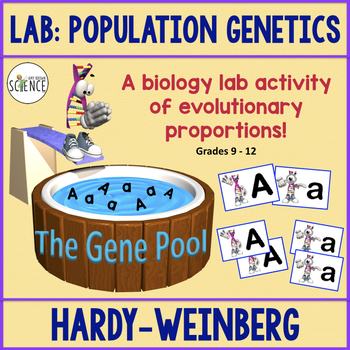Hardy Weinberg Population Genetics Lab Simulation
- Zip
What educators are saying
Also included in
- This NO PREP, PRINTABLE, EDITABLE, AND DIGITAL Biology Curriculum contains everything you need for an entire year of Biology! For less than $3 a day, you can save your time, energy, and sanity. Each of the 20 Complete Units includes a teaching PowerPoint presentation, notes, labs, homework assignmenPrice $525.00Original Price $988.18Save $463.18
- This "Population Genetics Complete Unit Bundle" includes everything you need to teach a unit on "The Evolution of Populations" to your life science or biology students. Many of the resources are available in BOTH printable and digital formats. The bundle contains a 94-slide PowerPoint presentation,Price $39.99Original Price $50.23Save $10.24
Description
In this lab simulation, students will learn how the Hardy-Weinberg Principle is used to detect changes in the gene pool, and how changes in the gene pool lead to evolution. Students in the classroom will mimic a breeding population of individuals. Students will “mate” using allele cards to show the outcome of genotypes and phenotypes in future generations.
Purpose of the Lab:
- To simulate how changes in the gene pool might occur by using the class as a breeding population of individuals.
- To observe how the Hardy-Weinberg equation is used to detect changes in allele frequencies in a population.
Materials List:
- PTC test papers
- Calculator
- Allele cards (Included)
- Coins
- Pencil and paper
What will the students be doing?
- In this lab simulation, the students in the classroom will mimic a breeding population of individuals. Students will “mate” using allele cards (included) to show the outcome of genotypes and phenotypes in future generations.
- Students will learn how changes in the gene pool result in evolution.
- Students will learn how to use the Hardy-Weinberg equation to determine the frequency of alleles in a population.
- Students will make data tables, compile class data, work out the math, and answer a series of critical thinking questions at the conclusion of the lab.
- Lots of Hardy-Weinberg Practice Problems!
What is included in this product?
- 12-Page EDITABLE Student Handout that is ready to be printed and passed out to your students. Students can write on the handouts or use their own notebook paper.
- Allele Cards used in lab simulation
- Complete instructions.
- 12-Page Teacher Guide containing tips, tricks, and suggestions.
- Complete Answer Key and Solutions to all problems.
- Everything you need for the successful completion of this lab.
If you teach the Hardy-Weinberg Principle during your unit on Evolution, this lab will ensure that your students understand:
- The basic assumptions of the Hardy-Weinberg Principle
- How changes in the gene pool result in evolution.
- How to use the Hardy-Weinberg equation to determine the frequency of alleles in a population.
Students will carry out four different simulations:
- Determining the Frequency of a Trait in a Population
- Testing the Hardy-Weinberg Principle
- Testing the Hardy-Weinberg Principle for Selection Pressure
- The Heterozygote Advantage
This simulation lab activity is appropriate for biology students in grades 9 - 12.
Related products include:
Population Genetics and Speciation PowerPoint and Notes
Hardy-Weinberg Practice Problems
Population Genetics, Hardy-Weinberg, and Speciation Task Cards
Evolution Lab: Variation in a Population
Population Genetics Crossword Puzzle
Population Genetics, Hardy-Weinberg, and Speciation: Set of 3 Homework Assignments
Evolution of Populations: Set of 3 Quizzes
The Evolution of Populations (Population Genetics) Unit Text
Genetics Complete Teaching Bundle
Evolution and Classification: Warm Ups, Bell Ringers and Interactive Notebooks
Darwin's Theory of Evolution PowerPoint and Notes
Lab: The Hardy Weinberg Equation
For updates about sales and new products, please follow my store:
I would love to have you follow me at these locations as well:
My Blog: Amy Brown Science.com
Instagram: @AmyBrownScience







